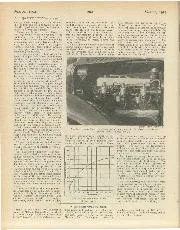

THE 1 1/2 LITRE SINGER
THE 1-' LITRE SINGER 2 A SMALL SPORTS CAR WHICH COVERS THE GROUND IN CONVINCING FASHION. WAS the first 14-litre Singer prod-need with a view to successful participation in trials,…
It’s strange times as Formula 1 grinds to a coronavirus-induced halt along with the rest of the world.
The cancellation of the Australian Grand Prix mid-event was swiftly followed by postponements of the immediately-following Bahrain and Vietnam races, China had been called off weeks earlier. Bahrain had been preparing to host the first spectator-less grand prix but, in the end, that precaution wasn’t necessary as Ferrari, Mercedes and Renault had all decided they would not take part, nor supply engines, which would have left just the four cars from the two Red Bull teams.
As things stood at the time of writing, the Netherlands, Spain, Monaco and Azerbaijan races had been halted, bringing the total of affected grands prix to eight, and there was little optimism that the following races would happen on their scheduled dates. Limits on crowd gatherings and restrictions on travel seemed unlikely to be lifted in time.
As a shocked F1 looked at what might – at a later date – be salvaged from the season, Ross Brawn confirmed that the early thinking was using up the previously scheduled summer break to claw back lost races. But Brawn acknowledged that getting them all back was unlikely. Although the Melbourne race has officially only been postponed, Australia’s isolated geographical location, and the logistical challenge of hosting a race within Melbourne, makes it unlikely to return this year.
“Maybe we take a hiatus, we take a pause,” said Brawn. “Then we use that opportunity to say: ‘right, for this time at the beginning of the year we won’t have any races, we’ll look at relocating those races later in the year’. I think by freeing up the August break, we give ourselves several weekends where we can race. And I think we can build a pretty decent calendar for the rest of the year. It will look different, but it will still preserve a good number of races, and they’re exciting races. So the season’s going to start later, but I think it will be just as entertaining. I think we can squeeze them in. But it depends on when the season will start.”
“It’s probably an optimistic view to believe there will be a 2020 season at all“
Given the unknown future trajectory and impact of the virus, it’s probably an optimistic view to believe there will be a 2020 championship at all. But for now, F1 is hopeful that even with a start as late as June, it could still fit in 17 or 18 races. Money from the race hosts and TV companies are, of course, the lifeblood that keeps F1 and the teams alive. The more races that can be rescued, the better – but it’s not in the hands of F1.
But let’s assume a late-June start – and Brawn’s target of 17 or 18 races. How might it look? Canada could be the opening race of the season, with the France/Austria back-to-back staying as scheduled two weeks after Canada. A further two-week gap then follows before Great Britain, with Hungary following two weeks after that to take us up to what had been the summer break.
Races could be slotted into those spare weekends before the break. But challenging. “The teams have got to be flexible,” warns Brawn, clearly anticipating resistance herding the cats. “They need to give us scope to give them good economic opportunities. We don’t want to put teams in financial hardship because someone doesn’t want to do three weekends on the trot.”
There are three weekends currently spare in the summer between the Hungarian and Belgian races. These would be the favourite slots to make space for Holland, which is three-times over-subscribed and a major part of F1’s business model, and possibly Spain – less crucial as it’s struggling to make its race pay and was only granted a late reprieve this year. Monaco, which uniquely doesn’t pay a host fee and undergoes a major reorganisation of a town to accommodate it, has been lost to the 2020 calendar.
After the Spa/Monza back-to-back races, we’re scheduled to head off for the long hauls – and this is where some of the early-season long-haul events might be slotted into place, probably around the fixed point of Singapore’s date, given the logistics of taking over the city.
To accommodate this revised schedule, date changes would have to be made as part of a physically gruelling sequence at the end of the season. Brawn talks of having some two-day meetings to reduce the strain. That looks hugely ambitious from the perspective of mid-March.
Furthermore, if we look at the projections of the virus spread, many have its peak coming in mid-June. Perhaps all this rescheduling is impossibly optimistic? Eight races are all the FIA statute books insist on to make an official World Championship. Whether F1 and every team could survive financially on those terms is doubtful.
“Are we looking at various options? Sure,” says Liberty’s Chase Carey. “But I don’t think you can put plans in place longer-term. We will see where it evolves. Everybody hopes it gets back to a place where it’s a functioning world and marketplace.”
Since he began covering grand prix racing in 2000, Mark Hughes has forged a reputation as the finest Formula 1 analyst of his generation
Follow Mark on Twitter @SportmphMark